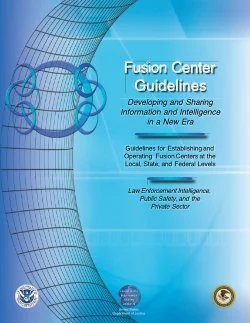By The U.S. Department of Homeland Security (DHS)
This document was developed through efforts by the U.S. Department of Homeland Security’s (DHS) Homeland Security Advisory Council (HSAC or Council) Intelligence and Information Sharing Working Group, to develop guidelines for local and state agencies in relation to the collection, analysis, and dissemination of terrorism-related intelligence (i.e., the fusion process). Those efforts laid the foundation for the expansion of the Fusion Center Guidelines to integrate the public safety and private sector entities. The guidelines are intended to ensure that fusion centers are established and operated consistently, with enhanced coordination efforts, strengthened partnerships, and improved crime-fighting and antiterrorism capabilities. Key elements include: sector-specific information and sharing plans; identification of goals for the fusion center; creation of a representative governance structure and collaborative environment for intelligence sharing among local, state, tribal, and federal law enforcement agencies, public safety agencies, and the private sector; utilization of memoranda of understanding (MOUs), non-disclosure agreements (NDAs), and other agency agreements, as appropriate; leveraging of databases, systems, and networks to maximize information sharing; creating environments that promote communication among entities; development and publication of privacy and civil liberties policies; ensuring appropriate security measures for the facility, data, and personnel; integration of technology, systems, and people; achievement of a diversified representation of personnel based on the needs and functions of the center; ensuring adequate personnel training; provision of multitiered educational program for intelligence-led policing and information sharing; offering a variety of intelligence services and products to customers; developing and adhering to a policies and procedures manual; defining expectations and performance measurement for determining effectiveness; establishing and maintaining the center based on funding availability and sustainability; and the development and implementation of a communications plan among personnel, officers, and the general public. The eighteen guidelines provided reflect those key concepts; the document includes eight appendices.
Washington, DC: DHS, 2023. 104p..








